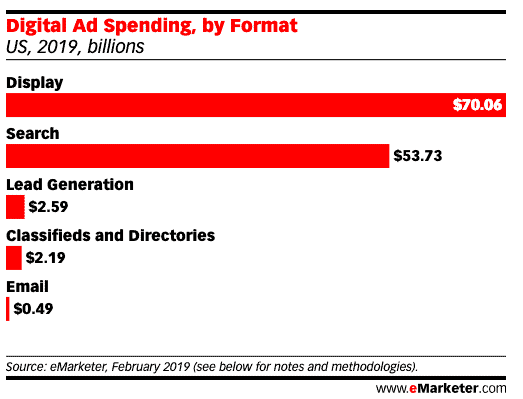Google searches are one of the most important ingredients in search engine marketing. We dive into just how many google searches per day there are, and some other Google Search factoids that search marketers will find interesting.
Search marketing is one of the most used channels in advertising and it’s still growing year after year, making ad management pivotal in maximizing campaign effectiveness.
Brands are on pace to spend $53+ billion in the U.S. alone this year on Search.. Although “Display” is technically larger by some methodologies (including eMarketers’s below), it includes various formats such as Social Advertising which marketers tend to split out in their media plans from the traditional online display budget.

Most ads are “pushed” in front of consumers regardless of what they are doing at the time (i.e. tv commercials, online display ads, social ads, etc.). But search ads are “pulled” by consumers into search engine results pages as they search on key terms that brands bid on.
Thus, the ad medium requires consumers to perform searches in order to generate impressions. If searches were to go away tomorrow, so would search engine advertising. Conversely, if searches were to double tomorrow, the number of ad impressions available would likely double too.
So, for search marketing professionals to truly understand the nature of the channel that they work in, they should understand the ins and outs of search behavior. This starts with simply knowing how many searches happen on the largest search engine in the world.
How many searches are there on Google?
Although Google does not share exact numbers, as reported by SEOTribunal.com, Google handles 3.8 million searches per minute on average across the globe.
That comes out to 228 million searches per hour, 5.6 billion searches per day, or 2 trillion searches per year!
That’s a lot of searches!
Other interesting Google Search factoids
Google has 90.46% of the search engine market share worldwide. Although there are many other search engines including Bing, Baidu, Yandex, and others, Google is by far the worldwide leader in search engine searches.
Of course, many internet searches are done on other websites as people search within a website for products, information, and other things. However, in terms of searches on search engines, Google is certainly handling the bulk of the traffic.
15% of all searches have never been searched before on Google. Just a few years ago, Google stated this in a post on their blog:
There are trillions of searches on Google every year. In fact, 15 percent of searches we see every day are new—which means there’s always more work for us to do to present people with the best answers to their queries from a wide variety of legitimate sources. While our search results will never be perfect, we’re as committed as always to preserving your trust and to ensuring our products continue to be useful for everyone.
Many of these unique searches are date or location specific that may be never searched for again.
Google has a market value of $773+ billion (on the date that this post was published). A vast majority of that is from SEM advertising, and Google reached the big milestone of $100 billion in annual revenue for the first time in 2018.
From Ycharts, Google’s parent company, Alphabet’s market cap over the last 5 years:

What is the ceiling for Google searches?
For career search marketers, the most interesting thing to think about is how much bigger could Google searches get? Common sense would dictate that the more searches there are, the more search ad impressions there will be, and the stronger the outlook is for search engine marketing to continue to thrive as a channel.
From a Moz article, by co-founder Rand Fishkin, just a few years ago in response to the question: What percent of users perform one or more searches on a given day?
“This one blew my mind! Of the millions of active, US web users Jumpshot monitored in October 2016, only 15% performed at least one or more searches in a day. 45% performed at least one query in a week, and 68% performed one or more queries that month,” writes Fishkin. “To me, that says there’s still a massive amount of search growth opportunity for Google. If they can make people more addicted to and more reliant on search, as well as shape the flow of information and the needs of people toward search engines, they are likely to have a lot more room to expand searches/searcher.”
